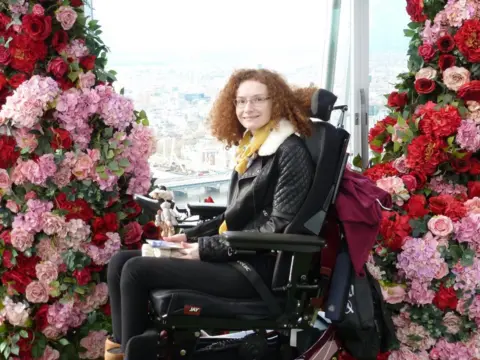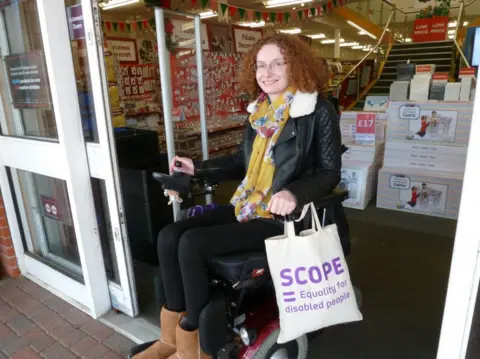Universal credit switchover is a bad move, say charities
 Hannah Deakin
Hannah DeakinPlans to forcibly move millions of people off legacy benefits and onto universal credit begin on Monday, amid calls for the process to be halted.
Some 2.6 million claimants will begin to receive letters urging them to apply for universal credit.
But leading charities warn the enforced switchover could leave some vulnerable people "unable to pay their bills".
Ministers insist the move to "a benefit system suited to the 21st century" will be "carefully managed".
The Department for Work and Pensions (DWP) aims to move all claimants to universal credit by the end of 2024.
The letters - to be sent out from Monday onwards - will give claimants a deadline, usually of three months, to apply for universal credit.
But charities say they have received no assurances that vulnerable people who do not respond in time will not have their existing benefits cut off.
In an open letter to Work and Pensions Secretary Thérèse Coffey, more than 20 charities say the whole process risks pushing thousands of vulnerable people - particularly those with mental health problems and learning disabilities - into destitution.
"Those too unwell to engage with the DWP could be left unable to pay their rent, buy food or pay their rising energy bills," warns Paul Farmer, chief executive of the mental health charity Mind.
"The DWP should halt this process."
Winners and losers
The government's own analysis suggests almost half of the 2.6 million people who will be required to move to universal credit are in receipt of the main sickness benefit, Employment and Support Allowance, with a further million people currently receiving tax credits.
The DWP's latest projections suggest that following the move to universal credit:
- 1.4 million will be better off by £220 a month
- 300,000 will receive the same amount
- 900,000 will be worse off
Former floor layer Phil Wayland has been receiving Employment and Support Allowance for 10 years since being diagnosed with anxiety and depression.
His condition is often so severe he is unable to leave his home, making work impossible.
 Phil Wayland
Phil WaylandPhil, 41, is apprehensive about the change: "You've got roughly about a 50:50 chance of going either way," he says.
But money isn't his primary concern: "Universal credit is more focused on forcing you into work, regardless of your point in recovery from your condition."
He is better than he was, he says, but fears being made to return to work too soon could set back his mental health.
Hannah Deakin, a 31-year-old wheelchair user from Surrey, hopes the government has learned lessons from the "trials and traumas" of many disabled people since Personal Independence Payments (PIPs) were introduced in 2013.
 Hannah Deakin
Hannah DeakinHannah is in severe pain and cannot walk. She receives Employment and Support Allowance and enhanced PIP payments; she works 10 hours a week over several days.
She, like Phil, worries about being forced to take on more work than she can cope with, in order to secure a benefit which has not been designed specifically for disabled and chronically ill individuals.
"I hope this will not mean there is a lack of understanding that some disabled people can't work, or can work a few hours only. They are not lazy, they are just not able to, due to their symptoms, illnesses or disabilities."
Pressing ahead
The change, called managed migration, will start with around 500 claimants being contacted before being expanded.
The process was meant to be fully trialled in a pilot programme set up in Harrogate, North Yorkshire, in 2019, but the pandemic led to the experiment being stopped in early 2020 - after just 38 people had been "migrated".
The DWP has since decided not to restart the pilot but to proceed to moving everyone who remains on legacy benefits to universal credit.
A previous plan to pause and assess the process after 10,000 people had been moved has also been dropped.
 Getty Images
Getty ImagesMichelle Birley, who works for the Guinness Partnership Housing Association, took part in the Harrogate pilot, describing it as a "positive experience".
Among the key lessons was "to find a time where there are no life events coming up, for instance, a birthday, so you can help them move from budgeting perhaps weekly or fortnightly to budgeting monthly", she says.
James Taylor, director of strategy at the disability equality charity Scope, warned: "This is a bad move at a terrible time, and hundreds of thousands of disabled people are in the firing line.
"It means that as costs ramp up, support slides down."
Top-up money
The government says people who lose out in the move will get a top-up payment called "transitional protection", but this will erode in value as it will not rise in line with inflation.
Welfare experts are currently advising people on legacy benefits who fear losing out not to move voluntarily as they will not be eligible for the top-up.
"It's better to wait until the DWP contacts you. This way you'll get some short-term support with your income to help you manage the change," says Morgan Wild, Citizens Advice head of welfare policy.
"Once you've moved, you won't be able to go back to your previous benefits, so it's really important to understand how the move to universal credit will affect you, especially in the long term."
A DWP spokesman said: "Over five million people are already supported by universal credit.
"We know work is the best route out of poverty and universal credit is a dynamic system which adjusts as people's earnings change, is more generous overall than the old benefits and simplifies our safety net for those who cannot work."
The spokesman said moving to universal credit would boost the incomes of 1.4 million people by a total of £4bn a year.
